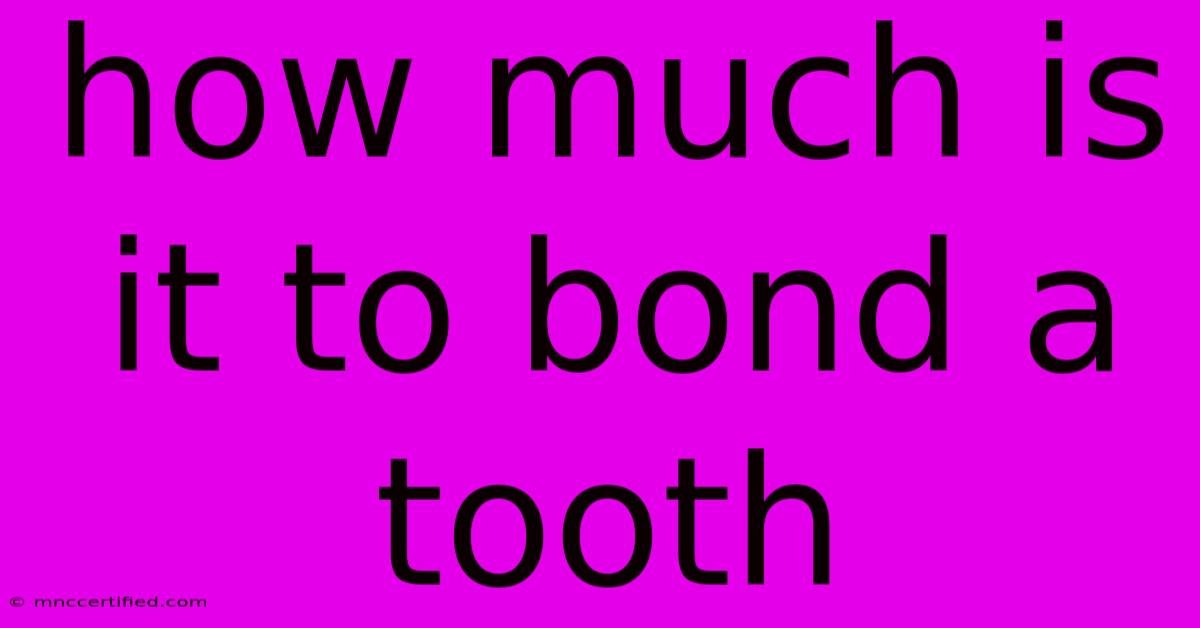How Much Is It To Bond A Tooth

Table of Contents
How Much Does it Cost to Bond a Tooth? A Comprehensive Guide
The cost of bonding a tooth can vary significantly depending on several factors. Understanding these factors is key to budgeting for this common cosmetic and restorative dental procedure. This comprehensive guide breaks down the cost, influencing factors, and what to expect during the process.
What is Tooth Bonding?
Tooth bonding is a cosmetic dental procedure that uses a tooth-colored resin material to repair chipped, cracked, discolored, or gapped teeth. The resin is applied to the tooth surface, sculpted to the desired shape, and then hardened using a special light. It's a relatively quick and minimally invasive procedure compared to other restorative options like crowns or veneers.
Factors Affecting the Cost of Tooth Bonding
Several factors contribute to the final cost of tooth bonding:
1. Location:
Geographic location plays a significant role. Dental practices in urban areas or affluent neighborhoods generally charge more than those in rural areas or smaller towns. This is due to factors like overhead costs and the prevailing market rates.
2. Dentist's Experience and Expertise:
Experienced and specialized cosmetic dentists often charge higher fees due to their advanced skills and reputation. A highly-skilled dentist may provide a more precise and aesthetically pleasing result, justifying the higher cost for some patients.
3. Number of Teeth Bonded:
The cost is directly proportional to the number of teeth requiring bonding. Bonding multiple teeth will naturally result in a higher overall cost.
4. Complexity of the Procedure:
Simple bonding procedures, such as repairing a small chip, are less expensive than complex procedures, like correcting significant discoloration or closing a large gap. Extensive preparation or repair work increases the time and materials required, impacting the final cost.
5. Insurance Coverage:
Dental insurance plans vary considerably in their coverage of cosmetic procedures like tooth bonding. Some plans may cover bonding if it's deemed medically necessary (e.g., to repair a fractured tooth), while others may only offer partial coverage or none at all. Check with your insurance provider to determine your specific coverage before scheduling the procedure.
6. Material Used:
While most dentists utilize high-quality resin materials, subtle differences in the type and brand of resin can influence the final cost. Premium materials may be slightly more expensive but offer enhanced durability and aesthetics.
Average Cost Range
While a precise figure is impossible to state without knowing the specifics of your case, a reasonable estimate for bonding a single tooth in the United States ranges from $300 to $1,000. The cost for multiple teeth would be higher, proportionally.
It's crucial to remember that these are just estimates. Always get a detailed cost breakdown from your dentist before proceeding with the treatment.
Finding an Affordable Dentist
For those seeking more affordable options, consider:
- Dental schools: Dental schools often offer services at significantly reduced rates, performed by students under the supervision of experienced faculty.
- Dental discount plans: Several dental discount plans offer reduced fees at participating practices.
- Negotiating with your dentist: Don't hesitate to discuss payment options and explore the possibility of payment plans with your dentist.
Conclusion
The cost of tooth bonding is influenced by a variety of interconnected factors. While the initial price might seem daunting, it's essential to prioritize the long-term benefits of a healthy, aesthetically pleasing smile. By understanding the factors influencing cost and exploring different options, you can make an informed decision and find a solution that fits both your budget and your dental needs. Remember to always consult with your dentist for a personalized assessment and a detailed cost breakdown.

Thank you for visiting our website wich cover about How Much Is It To Bond A Tooth. We hope the information provided has been useful to you. Feel free to contact us if you have any questions or need further assistance. See you next time and dont miss to bookmark.
Featured Posts
-
Sam Fender Presale St James Park Tickets
Nov 26, 2024
-
Police Arrest Made After Ladbroke Grove Shooting
Nov 26, 2024
-
Sonic 3 Trailer Chao Garden Returns
Nov 26, 2024
-
Vic Bond Sales Lapeer Michigan
Nov 26, 2024
-
Farm Bureau Insurance Athens Tx
Nov 26, 2024